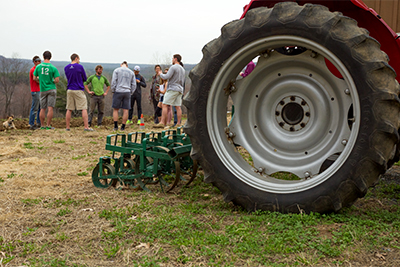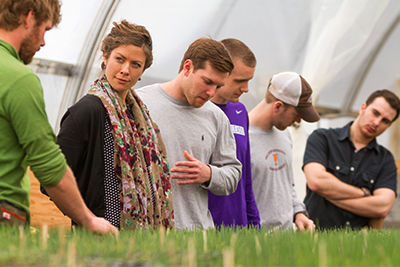The growing season is in full swing at Book & Plow Farm but the spring semester already saw a harvest —of knowledge.
The farm is now in its second year of providing organic vegetables to Amherst College’s Dining Services (and a handful of other customers), with some produce from this year's crop --Red Leaf Lettuce, Romaine Lettuce, Bok Choy, Scallions and Radishes-- already in the meal plans for Reunion 2014. The on-campus farm is expanding its operation, leasing more land from the college and coming up with increasingly ambitious plans for plantings.
Over that first year, relationships between the farm and the faculty have been taking root.
This past fall, for example, students in Michelle Stewart’s “Environmental Politics and Policies” course visited the farm for a unit on U.S. food production, and it made such an impression that three seniors, including one who has volunteered at the farm, came back to propose a new special topics course on organic farming.
The resulting Five College course, “Organic Farming Politics and Practice,” co-taught by Stewart and Book & Plow’s farmers Peter McLean and Tobin Porter-Brown, examines the role of organic in American policy and diet. Over the semester, students augmented their readings and classroom discussions with trips to the farm in Amherst’s backyard.

The course traced the history of U.S. agribusiness, examining the social and environmental dimensions of conventional farming. Students studied the rise of organic farming and how it compares to conventional farming.
The course also has a social justice component, asking whether the current organic food movement includes all citizens or only certain races and classes. Stewart said students looked at possibilities of a “beyond organics” system that addresses these issues.
“One question that moves in conversations about organic or the new food movement is:, Does it only cater to a high-end, gentrified population—essentially people who can afford it?” said Stewart, the Pick Visiting Assistant Professor of Environmental Studies.
“There are critical reads and reactions to organic as being a movement, because having something labeled ‘organic’ doesn’t necessarily comment on how something was produced,” she added. “Gender and labor dimensions are part of that. … ‘Organic’ really just means that it’s been produced without synthetic fertilizers or pesticides.”
Students came to the class from a variety of perspectives. Some are majors in Amherst’s new environmental studies program, but others are pursuing degrees such as biology, political science and economics.
Students’ final projects examined conventional and organic production, and how Book & Plow’s farming model involves such things as soil sustainability, community engagement and “beyond organic” production. They intend to make their research available via the farm’s website. In the meantime, they presented the projects at a special end-of-semester event for which Dining Services prepared appetizers of locally sourced vegetables, signifying Amherst College's commitment to provide sustainably produced food.

Stewart said other faculty members have already integrated Book & Plow into field-focused dimensions of their courses. For instance, Professor Anna Martini has taken her geology students to the farm to take water samples for a hydrology class.
Creating a working farm that provided learning opportunities has ,always been the intention, since 2010, when a student group first approached the college’s administration with the proposal for a campus farm. Soon, a committee of students, faculty and staff solicited proposals from farmers wishing to lease land with “the dual goals of raising local produce and conducting educational and research programs that involve the entire College.” The winning proposal came from McLean and Porter-Brown, who established Book & Plow in early 2013.
That first year, Porter-Brown said, they harvested close to 20,000 pounds of food on four acres. Now they’re expanding onto additional land from the college, growing vegetables on 10 acres and cover crop on three acres (to produce organic matter that will be plowed under to enrich the soil). The goal for 2014 is to harvest more than 100,000 pounds of produce.
“It’s constant transformation,” said Porter-Brown of the farming process. “You can see, over the course of a year, the land has gone through a whole season of producing. You really get in tune with the cycle of growth and harvest and death. And you just do it again and again.”